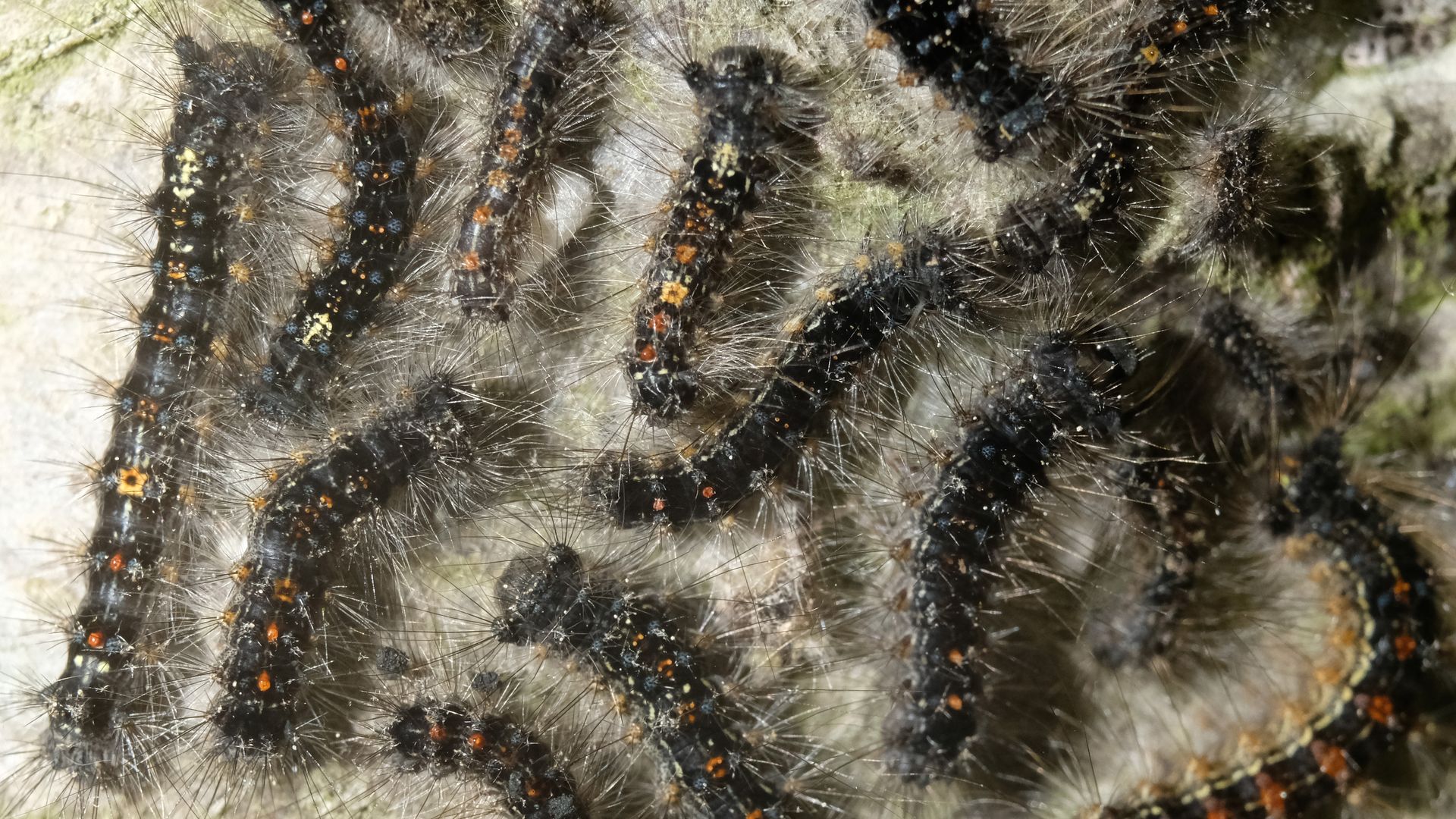From gypsy moths to Audubon, nature names face racism test
Add Axios as your preferred source to
see more of our stories on Google.

Freshly hatched caterpillars of gypsy moths on the bark of a red oak. Photo: Sebastian Willnow/picture alliance via Getty Images
Bugs, birds, fish and plants with names linked to white supremacists may be renamed, as science confronts its own ties to systemic racism.
Why it matters: The national reckoning was inevitably going to pass this way. The sciences have long underrepresented and erected barriers of entry to people of color and there’s a concerted effort for a reset under way in academia, research and hiring.
Driving the news: The Entomological Society of America announced this month insects known as Aphaenogaster araneoides and Lymantria dispar will no longer be called "gypsy ants" and "gypsy moths." Gypsy is a racial slur for Romani people.
- The U.S. Fish and Wildlife Service and other state agencies recently halted the use of "Asian carp" to describe some invasive species of fish in the wake of rising anti-Asian violence, The Associated Press reports.
- Bird Names for Birds has launched a campaign to change bird names, including the Hammond’s Flycatcher. That bird was named after former U.S. Surgeon General William Alexander Hammond, who once collected the brains of killed Indigenous people.
The intrigue: The American Ornithological Society announced in May its commitment to changing “exclusionary or harmful bird names.”
- The American Ornithological Society’s North American Classification Committee said last year the McCown’s Longspur would change to the Thick-billed Longspur following complaints about Confederate general John Porter McCown, an amateur ornithologist whose name is on the bird.
- Conservation activists say the Erythrina caffra, commonly known as the "African Coral Tree," should see a name change since it has roots in a slur used for South Africa's Black communities.
- California's Pinus sabiniana, or the “Digger Pine,” which is a pejorative term used to reference the Paiute and other Indigenous groups, also is seeing calls for renaming.
The National Audubon Society, the nation’s well-known bird conservation group, is debating whether to change its name. The group is named after John James Audubon, a bird enthusiast who also enslaved Black people.
Flashback: The reexamination comes as scientific institutions and biological diversity organizations publicly pledged their commitment to inclusion in the wake of George Floyd's death.
- Institutions and organizations also are confronting a past where science was largely defined and practiced by white men, who sometimes gave species problematic names with racial slurs.
- Science organizations say they want to make fields more welcoming for people of color. Doctoral degrees in science and engineering are still overwhelmingly conferred on white students, according to an analysis from the National Science Foundation.
- U.S. Rep. Al Green (D-Texas) and Sen. Elizabeth Warren (D-Mass.) introduced legislation to create a board to help rename more than 1,000 towns, lakes, streams, creeks and mountain peaks across the U.S. that are still named with racist slurs.
What they're saying: "We know that changing bird names is not going to fix racism as much as I wish it would. But we're working on removing this one brick, that is part of this huge thing we need to deal with," Jordan Rutter, a co-founder of Bird Names for Birds, told Axios.
- "You have these names that really just represent white colonialism and the perspectives that they had when they decided these are the names," said Gabriel Foley, a group co-founder.
- Rutter and Foley said the movement to change names also is about the process where people can engage in social justice and science.
The other side: Bird names are one of the treasures of the English language and not all bird names are derived from old white men, wrote Helen Andrews, a senior editor at The American Conservative.
- "Some are just very, very old. Our Anglo-Saxon ancestors were talking about swans, sparrows, and ravens when William the Conqueror was a boy," Andrews wrote.
- "To preserve the richness of American bird names for future generations, today’s politically correct literalists deserve (a) brushoff."
